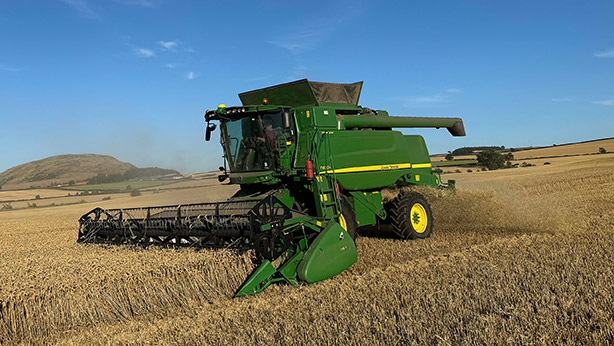Harvest 24: Spring barley and wheat off to slow start in North
 Submitted by Alasdair Elder
Submitted by Alasdair Elder Wetter weather has hindered harvest progress up and down the country, but quality remains decent in most areas.
See also: Worst harvest for nearly 40 years at Northumberland farm
Lincolnshire
Mixed quality, ergot and lower yields are the headlines coming out of Union Grain, near Skegness, with weather conditions the main contributing factor.
The co-op has taken in 4,000t of wheat, 1,600t of barley and 1,300t of oilseed rape so far.
“We’re predicting to be 30-40% down on where we would normally be,” says Richard Hubbart, Union Grain company secretary.
“A lot of people had oilseed rape failures, then re-drilled with a winter or spring crop.
“Where it did grow, more was lost during the prolonged rain. Of what little we have seen, quality is reasonable.”
Ergot is an issue in winter wheat and winter barley. “Pretty much every tonne we’re getting is going to need colour sorting,” he adds.
Ergot aside, winter wheat quality has been pleasantly surprising, with specific weights around 77kg/hl.
“We were all expecting issues with quality, but that hasn’t materialised, so that’s a bit of good news,” says Richard.
“If some of the spring crops come in slightly poorer, we have the option to blend them.”
Co Durham
Further north, Grainco has just started taking in wheat, which has been averaging 7.4t/ha.
“The small amount of first wheat that has been done may be slightly better, but there are many fields which don’t have full crops,” says Dave Young, Grainco farm trader.
“Specific weights have been variable at 60-65kg/hl, which is down to a lack of sunshine in May and June.”
Winter barley yields have also been below average, at 6.1-7.4t/ha.
“Oilseed rape has been disastrous; we have had severe problems with flea beetle,” says Dave.
“Autumn 2023 was good for flea beetle and not for the crops – a lot didn’t survive at all, and what has survived yielded around 2.4t/ha.”
Oil content has been around 42-43%. Winter oats have been performing the best of the crops. “They have yielded 7.4t/ha, and the specific weight is acceptable at 53-55kg/hl.”
Perthshire
Harvest is also making slow progress for general manager Robin Barron at East of Scotland Farmers, which manages 170 member farms.
Although yield is down, he is pleased with the quality of winter barley and oilseed rape.
“We do a lot of Craft malting barley which has made malting standard, but yields were disappointing, averaging 7.4t/ha compared with our normal 8.5t/ha,” says Robin.
The two biggest crops – spring barley and wheat – have got off to a slow start due to changeable weather, with 70,000t to come in.
“We are not quite at our latest year to date, but if we do not get cutting soon, we will soon be into that realm.
“The forecast isn’t great for the next few days, so I don’t see we will make much progress until next week.”
Despite the delay, early indications for yield and quality are looking positive, with spring barley averaging 1.3% nitrogen and screenings at 5-6% through a 2.5mm sieve.
Skinning, which was a problem last year, is low this year, averaging 1-2%.
Monmouthshire
Over in Wales, Colin Phillips at Dairy Farm near Raglan has 53ha of winter wheat left from his 154ha of Palladium, Graham and Fitzroy.
“We started harvesting wheat on 31 July – it’s been very drawn out with drizzle keeping the crop damp,” he says.
But despite being down on his five-year average, he is pleased with yields, averaging 9.8t/ha, and pushing up to 11t/ha in some areas.
The 41ha of Aurelia oilseed rape yielded less than last year, but had higher oil content at 47.5%, compared to 43.5%.
His 61ha of Tardis winter barley averaged 7.9t/ha, with grain looking bold and golden.
As well as his remaining wheat, he has 16ha of Lynx spring beans to go at in mid-September. “We typically drill in mid-March, but couldn’t get on the field until mid-April.”

